Trailer Time
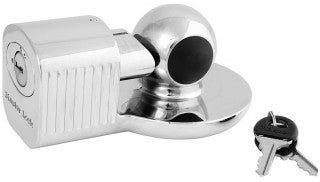
Upgrade your sled trailer for functionality, safety and security
When it comes to snowmobile trailers, we are not fans. Given our preference, we would live where one can ride directly out of the garage or shop to a snowmobile trail. Barring that, we would opt to drive up a ramp and plant our sled in the back of an extended pickup bed. Our final choice is a snowmobile-specific trailer.
Primarily because we’ve had some troublesome experiences over the years, we view sled trailers as necessary evils. Of course, we can state that our experiences have also been good, as we’ve learned as much about ourself as we have about sled carriers. For example, because we no longer have a pickup with a bed suitable for carrying today’s extended track sleds, we’ve invested in two different trailers. One is a v-nosed two-place trailer with ramp. The other is a single-place tilt model. We have fixed up both to make them work for us. And, please note, neither trailer is the cheapest we could get.
There is great truth to the adage, “You get what you pay for.” When we went cheap on our trailers, we got cheap. We had to replace the lights and wiring system within a season of usage. Our current trailers have recessed wiring and high quality lighting that has saved much aggravation. When the tilt model tips, there is a protective lip to keep the rear lights from getting mashed or broken.
We have outfitted the trailers to match our expected usage. Because we tend to travel solo more often than not, we utilize our single trailer most as it is equally handy for hauling our ATV or sled. Because we may be on the road alone, we made a couple of extra additions.
Winching Dead Sleds
For example, it has happened that we have had to load a sled that refuses to run. By using a sled dolly, we can get the sled out of the garage and position it to load. Once at the dealership we’ll have help to offload the sled. It’s that “in-between” sequence that can be the deal breaker. But, adding a winch post and marine-type hand winch solves he problem. We can simply hook on to the sled or ATV and haul it on to the trailer. Even when we run a sled or ATV up onto the trailer without winching it, we frequently use the winch to secure the vehicle for travel.
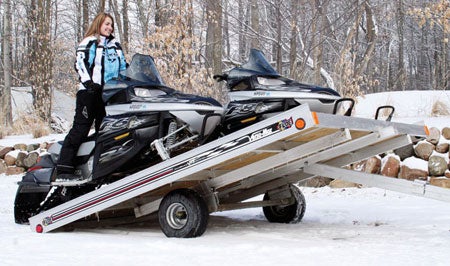 Protect your trailer investment with secure locks.
Protect your trailer investment with secure locks.Originally we had a hard time finding an appropriate winch post, but now there seem to be quite a few options available. You can let your fingers do an on-line search by simply inserting the words “trailer winch post” into your search criteria. There are a number of on-line outlets that have winch posts available. Be sure to measure your trailer’s tongue width, as this will make a difference in what you should get for a post. Expect to pay US$30.00 more or less for a galvanized boat trailer winch post that will fit a 2-inch wide tongue. You’ll find that the posts come in various heights and levels of construction. A 24-inch post height should work okay, but check this out for yourself as you may find it better to get a taller post for your specific needs.
We found trailer winch posts online at the Trailer Parts Superstore. You’ll find the necessary parts at Pacific Boat Trailers as well. Other options are The Trailer Parts Depot or eTrailer.com. You’ll want to check out the add-on pricing such as taxes (if any) and shipping costs. When outfitting our Jeep Wrangler with a new front bumper, we actually discovered it was cheaper and much more convenient to go to our local Jeep dealer to order the parts and have them installed than it was to order online and have the parts shipped to us — which we then would have had to install ourselves! The lesson being, don’t automatically assume that buying online is the least expensive option. If you live in a boating area, such as the 10,000 lakes country of Minnesota, you may be able to get these pieces locally for less. Of course, the post is just one part of the cost. You’ll need to get a hand winch and the winch strap, too. You may find as we did that adding a hand winch to your trailer makes it much more useful.
Lock Down
Now that we’ve found trailers that we like and have made investments in them, it pays to protect them. Purchase a couple of trailer locks for piece of mind. We say a couple because we view trailer locks as having two separate functions. There is the lock you use to keep your trailer locked to your tow vehicle when on the road and there is the trailer lock you use to keep your trailer secure when it’s being stored.
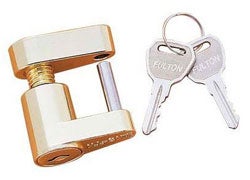 When on the road we use a pin lock like this Fulton Brass Lock to secure our trailer to the receiver.
When on the road we use a pin lock like this Fulton Brass Lock to secure our trailer to the receiver.We had a fairly nice three-place aluminum snowmobile trailer that we kept parked alongside our office building. We used a simple US$8.00 trailer hitch lock like those that we’d used on our other trailers. Well, while the manufacturer claims its lock helps theft-proof your trailer and its brass construction won’t rust, the truth is that a quick and sharp rap with a small sledgehammer renders the lock useless. Once it’s compromised your trailer goes missing. Fortunately our 3-place trailer was insured. And, we learned a valuable lesson. “You get what you pay for” applies to locks as well.
We still use a simple and inexpensive brass coupler lock, but now we use it only when we are actually on the move trailering. Instead of a putting a simple latch pin through the coupler to secure the hitch to the ball, we use the coupler lock. But, once we uncouple our trailer, we opt for a more expensive lock that mounts in the coupler and secures for a tight fit. We have both a bright yellow Fulton Marine Universal Coupler lock and a Master Lock Adjustable Coupler Lock, both of which we can recommend. Each will set you back US$40 or more and can be located at most hardware or marine and automotive parts stores.
We have both because the Fulton has to fit over the coupler and may not fit some couplers with trailer brakes, which the Master Lock does.
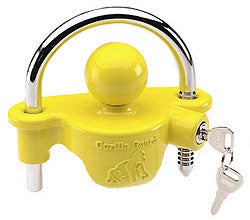 We’ve found locks like this Fulton UTL-100 Gorilla Guard Universal coupler lock that fit into the trailer’s ball coupler offer good piece of mind for theft prevention.
We’ve found locks like this Fulton UTL-100 Gorilla Guard Universal coupler lock that fit into the trailer’s ball coupler offer good piece of mind for theft prevention.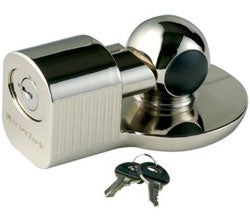 We’ve fitted Master Lock’s chrome 377DAT Universal Trailer Coupler Lock when we store our trailers.
We’ve fitted Master Lock’s chrome 377DAT Universal Trailer Coupler Lock when we store our trailers.When towing, it’s also good to lock your tow receiver assembly to your truck as well as the trailer to your hitch. We have a locking pin assembly that keeps the receiver secured. Still, if someone is determined to take your trailer, they’ll find a way. But these locks will certainly slow them down and discourage the lazy thief.
We may not be great fans of trailering, but we have learned to live with it and have worked to make our trailering experience as secure as possible.
Related Reading Bassett’s Blog: Trailer Maintenance Tips



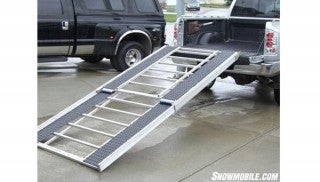
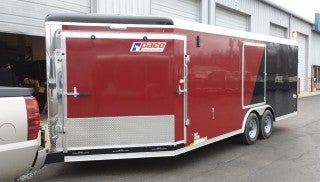
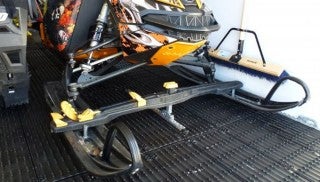


 Your Privacy Choices
Your Privacy Choices